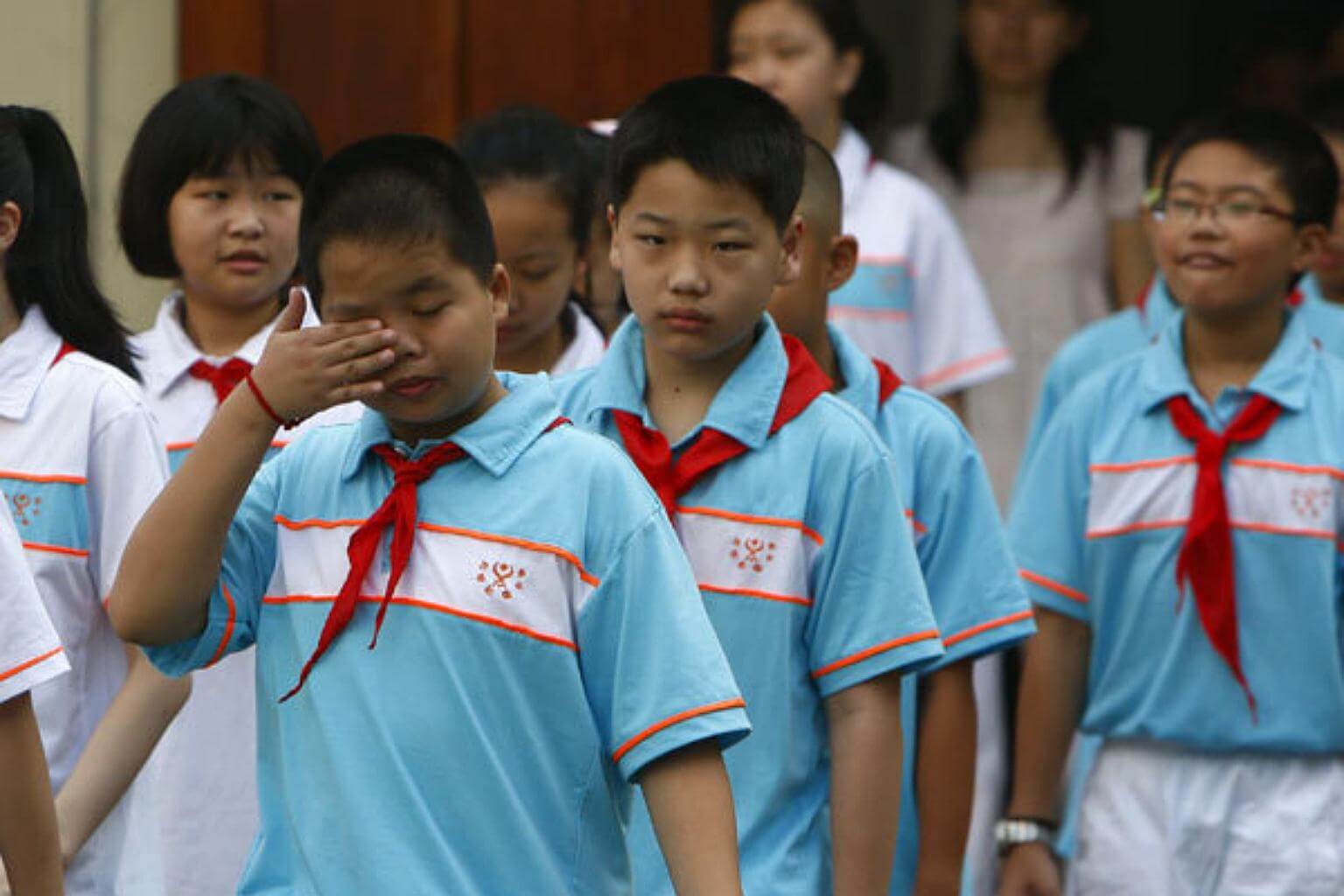Chinese students spending less time on homework - under three hours a day
Sign up now: Get insights on Asia's fast-moving developments

A sleepy student rubs his eyes during a ceremony held to open a new semester at Xiangming Junior High School, in Shanghai, on Sept 1, 2015.
PHOTO: CHINA DAILY/ASIA NEWS NETWORK
BEIJING (CHINA DAILY/ASIA NEWS NETWORK) - The amount of time that primary and middle school students in China spent on homework fell from 3.03 hours a day in 2016 to 2.87 hours last year (2017), according to a new study.
The report by afanti100.com, a Chinese online education service provider, is based on a survey of 446,836 students in 31 provincial areas, with 56.7 per cent from primary schools, 38.6 per cent from middle schools, and 8.7 per cent from high schools.
The research showed that it took primary and middle school students less time to finish their homework last year than in 2016. The average time per day fell to 2.87 hours - 2.64 hours for primary school pupils and 2.94 hours for high school students.
Although the average time fell, it was still more than other countries - twice the global average.
Experts and parents have called for reasonable amounts of homework and an evaluation system for students based on more than just examinations, while teachers advise parents not to focus on competition.
At the end of last year, the Ministry of Education introduced a standard for managing schools under the compulsory education period. It demanded that families and schools should cooperate to guarantee 10 hours of sleep for primary school pupils and nine hours of sleep for middle school students.
However, the online education platform's report showed that more than 80 per cent of students go to bed later than 10pm every day.
In 2013, the Education Ministry also issued a regulation on primary school pupils' homework, saying that there should be no written homework for Grade 1 and 2 pupils, and less than an hour of written homework for other grades. But the ministry is yet to introduce any rules on homework for middle school students.
FEELING TIRED
Liu Xuchen, 13, is studying at Hefei Shouchun Middle School, Anhui province, and will take the high school entrance examination this summer. Xuchen said most of her classmates spend nearly four hours on homework every day.
"I feel tired every evening and my homework is for seven subjects, all of which will be tested in the exam," Xuchen said.
Those seven subjects are Chinese, mathematics, English, physics, chemistry, political education and history. But not all the subjects carry the same weight in the examination, with Chinese, maths and English having the highest weightage.
Another problem Xuchen faces is the difficulty of her homework. She said a difficult maths question could take her nearly 30 minutes.
According to the report, 85 per cent of students experience negative emotions when doing their homework, including getting upset and losing their temper. And 76 per cent of parents argue with their children when helping them with their homework.
"I think teachers should create a balance between the number of hard and easy questions," Xuchen said.
QUALITY NOT QUANTITY
Schools in other areas, however, assign less homework.
Mr Yuan Hairong is a teacher with almost 20 years of experience at the Experimental High School Attached to Beijing Normal University.
"Most of our students who will take the high school entrance exam this year spend two and a half hours at most on homework every day," he said.
Unlike Anhui, Beijing's exam only tests five subjects - political education and history are not included.
"But many parents send their children to tuition classes for those five subjects, which also occupies a lot of time," Mr Yuan added. "Many parents don't want to see their children left behind, so they arrange extra classes and homework."
Researcher Chu Zhaohui at the National Institute of Education Sciences, said it is the single evaluation system for students that leads to the homework burden.
"The schools only assess students' development using scores and ranks," he said. "The government and society must try to enrich the assessment system, which would help students find advantages in different ways rather than focusing only on passing examinations."
Said Mr Zhang Haoqiang, principal of the Hangzhou Shengli Experimental School in Zhejiang province: "We should focus on reducing redundant homework. After all, homework is a key method to consolidate knowledge.
"We cannot ease students' homework burden by simply reducing the quantity, but by improving the homework quality so that they can achieve more through doing less homework."


